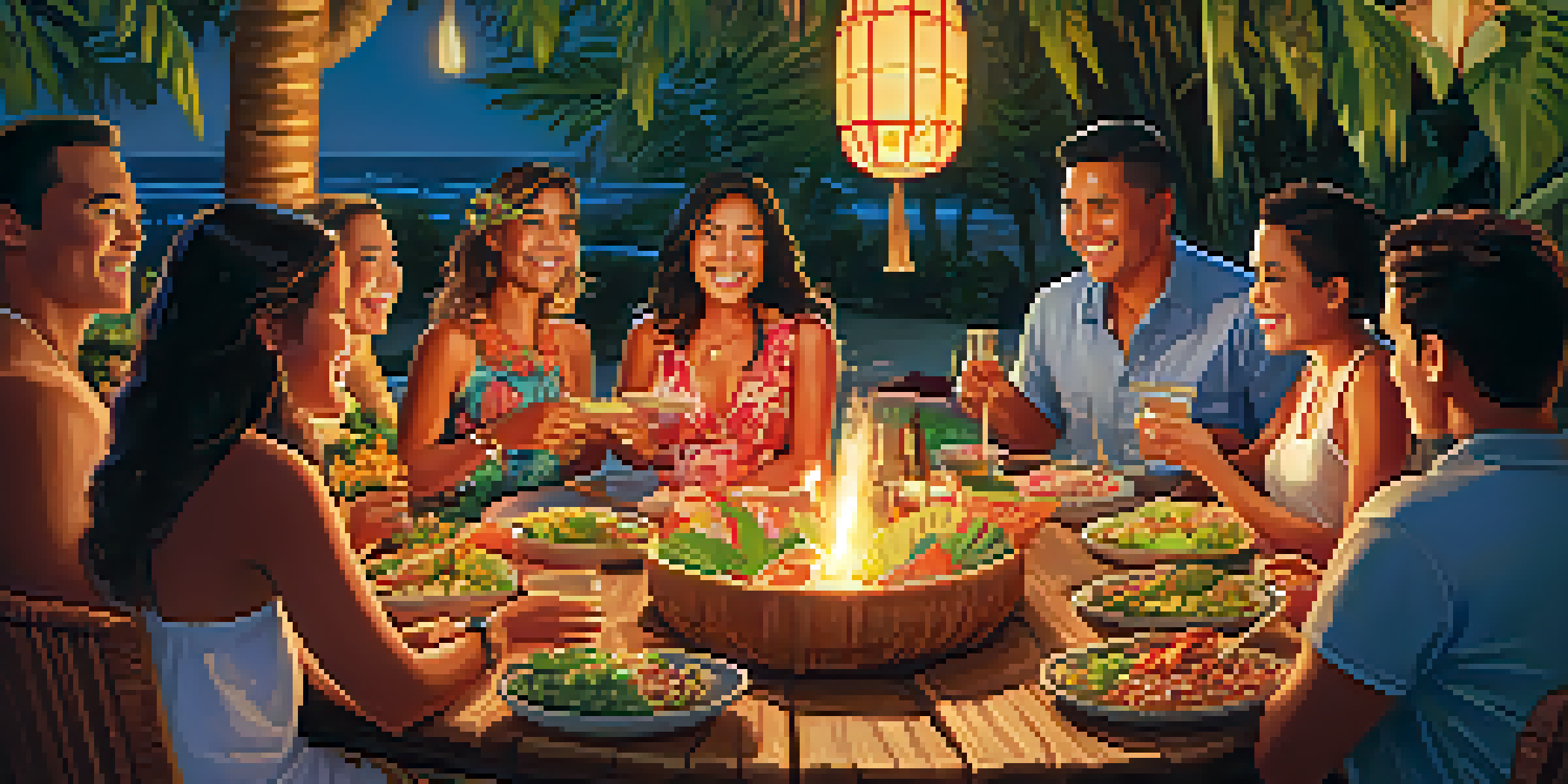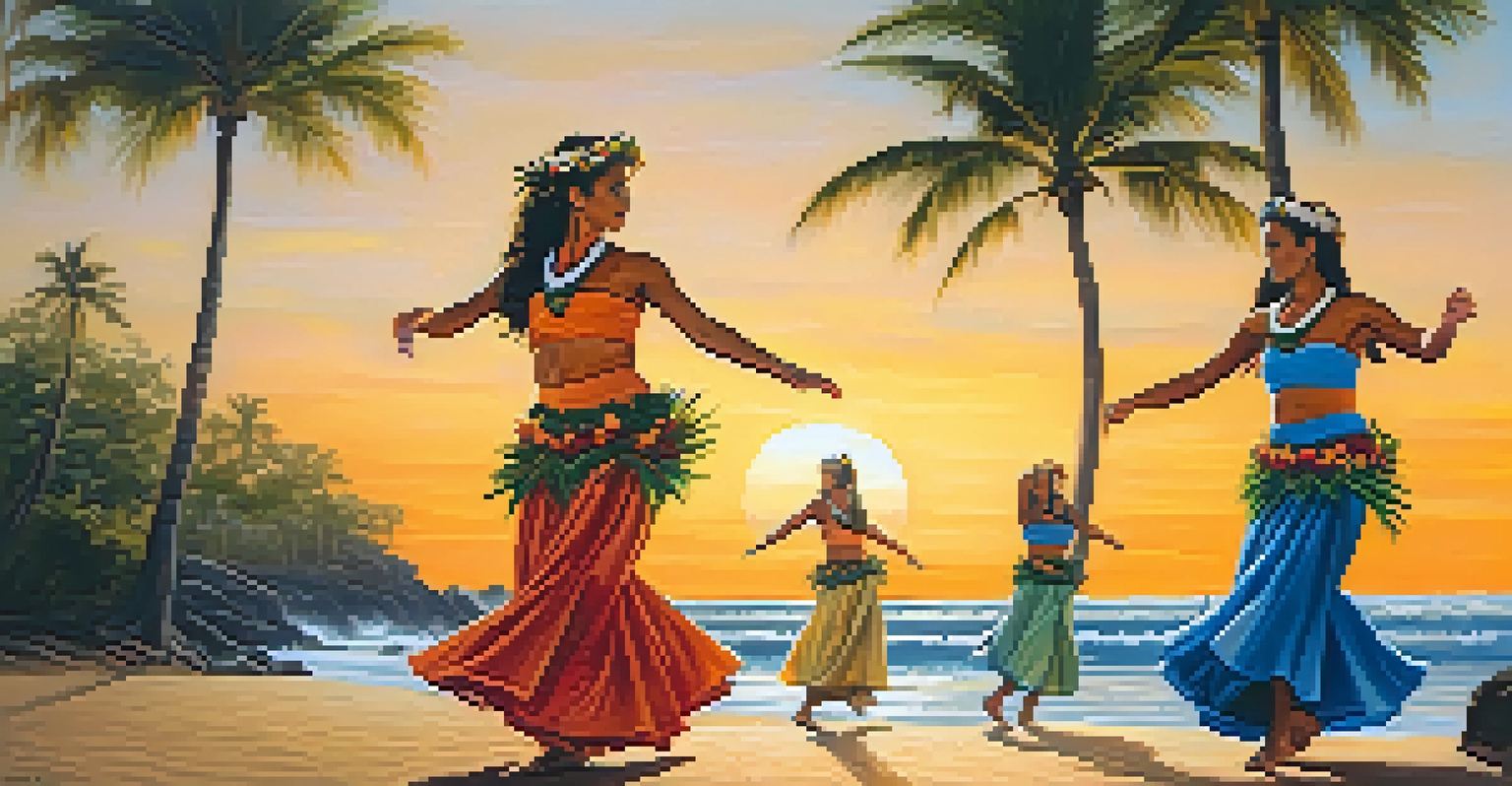Traditional Hawaiian Customs: A Look into Daily Life

Understanding the Importance of 'Ohana in Hawaiian Life
In Hawaiian culture, 'ohana, or family, is at the heart of daily life. This concept extends beyond blood relations to include friends and community members, emphasizing the idea that everyone is connected. The support system provided by 'ohana is vital, particularly in times of need or celebration.
'Ohana means family, and family means nobody gets left behind or forgotten.
Gatherings often revolve around family, showcasing the deep roots of tradition. Events such as luaus or family reunions highlight the importance of togetherness, where food, stories, and laughter flow freely. In this way, 'ohana serves as a source of strength and cultural preservation.
Furthermore, the emphasis on 'ohana fosters a sense of belonging and responsibility among members. Each person plays a role in the family unit, reinforcing bonds that contribute to the overall wellbeing of the community. This interconnectedness is a beautiful reflection of Hawaiian values.
The Role of Aloha Spirit in Daily Interactions
The Aloha Spirit is a guiding principle in Hawaiian culture, encapsulating love, respect, and compassion. This philosophy is not just a greeting but a way of life that influences daily interactions. When you embody the Aloha Spirit, you create a welcoming atmosphere that promotes harmony.

In everyday scenarios, the Aloha Spirit manifests through simple gestures, such as a warm smile or a friendly wave. These acts foster connection and encourage positive relationships, making interactions more enjoyable. It’s a reminder that kindness can have a ripple effect.
Ohana: The Heart of Community
'Ohana extends beyond blood relations, emphasizing interconnectedness and support within families and communities.
Moreover, the Aloha Spirit extends to how people treat nature and the environment. By respecting the land and resources, Hawaiians demonstrate their commitment to sustainability, ensuring that future generations can enjoy the beauty of their islands. This holistic approach is a testament to the deep-rooted values of Hawaiian culture.
Traditional Hawaiian Cuisine: A Blend of Culture and Community
Food in Hawaii is more than just sustenance; it's a celebration of culture and community. Traditional dishes like poke, kalua pig, and poi showcase the islands' rich agricultural heritage. These meals often bring families together, reinforcing the 'ohana bond through shared culinary experiences.
Aloha is more than a word. It is a way of life.
Cooking methods, such as imu (underground oven), highlight the significance of tradition in Hawaiian cuisine. Preparing a meal in this way is not just about the food; it’s a communal event where everyone contributes and learns. This collaborative spirit enhances the connection among participants.
Additionally, local ingredients play a crucial role in fostering a sense of place and identity. Many families grow their own produce, which ensures that meals are fresh and reflective of the island's bounty. This connection to the land underscores the importance of sustainability in Hawaiian customs.
Celebrating Life Through Traditional Hawaiian Festivals
Festivals are vibrant expressions of Hawaiian culture, filled with music, dance, and art. Events like Merrie Monarch Festival and Aloha Festivals showcase traditional hula, chants, and crafts that have been passed down through generations. These celebrations not only entertain but also educate attendees about the rich history of the islands.
In addition to entertainment, festivals serve as a way to honor ancestors and cultural practices. Participants often dress in traditional attire, embodying the spirit of their heritage. This sense of pride fosters a deeper appreciation for the customs that define Hawaiian identity.
Aloha Spirit Enhances Interactions
The Aloha Spirit promotes love, respect, and compassion, creating positive connections in daily life.
Moreover, festivals promote community engagement, as people come together to celebrate their shared culture. This unity strengthens social bonds and encourages younger generations to participate, ensuring that these traditions continue to thrive. It highlights the importance of community in preserving Hawaiian customs.
The Significance of Hula in Hawaiian Culture
Hula is more than a dance; it’s a storytelling medium that conveys history, emotions, and cultural values. Through movements and chants, hula narrates tales of ancestors and the natural world, making it a vital aspect of Hawaiian identity. This art form serves as a living history that keeps traditions alive.
Learning hula is a communal activity, often taking place in groups known as hālau. These schools foster a sense of belonging and mentorship, where experienced dancers guide newcomers. The relationships built in hālau contribute to the preservation of hula as a cultural practice.
Additionally, hula is often performed during significant ceremonies and celebrations, further cementing its role in daily life. Whether it's a wedding, a funeral, or a festival, hula brings people together, allowing them to connect with their heritage. This deep-rooted significance makes hula an essential part of Hawaiian customs.
Navigating Daily Life with Spiritual Practices
Spirituality plays a crucial role in the daily lives of many Hawaiians, with practices that honor the natural world and ancestors. Many individuals engage in rituals such as pule (prayer) and ho'oponopono (discussion for resolution) to maintain harmony within themselves and their environment. These practices encourage mindfulness and reflection.
The connection to spirituality can also be seen in the reverence for nature, often viewed as sacred. Many Hawaiians believe that mountains, rivers, and oceans hold spiritual significance, guiding their interactions with the land. This respect fosters a sense of responsibility for preserving the environment.
Hula: A Living Cultural Tradition
Hula serves as a storytelling medium that preserves Hawaiian history and values through communal practice and celebration.
Furthermore, community gatherings often incorporate spiritual elements, reinforcing the bonds between individuals and their beliefs. This intertwining of spirituality and daily life creates a rich tapestry of experiences that reflect the values of respect and gratitude. It highlights how spirituality shapes the Hawaiian way of life.
The Role of Language in Preserving Hawaiian Culture
The Hawaiian language, 'ōlelo Hawai'i, is a vital aspect of cultural identity, serving as a vessel for storytelling and tradition. Efforts to revive and teach the language have gained momentum, as it is essential for keeping cultural practices alive. Speaking Hawaiian connects individuals to their heritage and strengthens community ties.
Language is often intertwined with cultural expressions, such as songs, chants, and proverbs. These forms of communication carry deep meanings and teachings that reflect the values of Hawaiian society. By learning and using the language, individuals honor their ancestors and promote cultural continuity.

Moreover, the resurgence of 'ōlelo Hawai'i in schools and community programs illustrates a commitment to preserving the culture for future generations. As more people embrace the language, it fosters pride and a sense of belonging, ensuring that Hawaiian customs remain vibrant and relevant. This focus on language is crucial in the ongoing journey of cultural preservation.